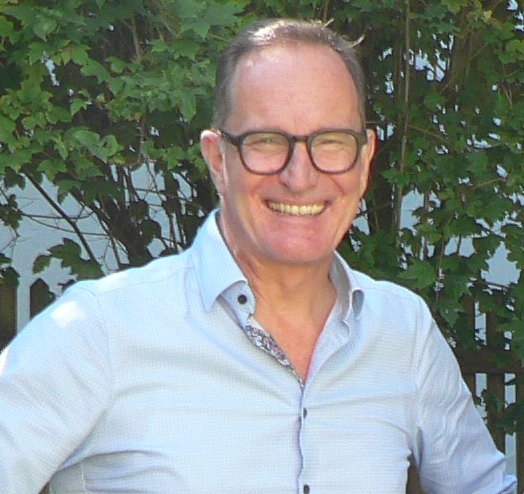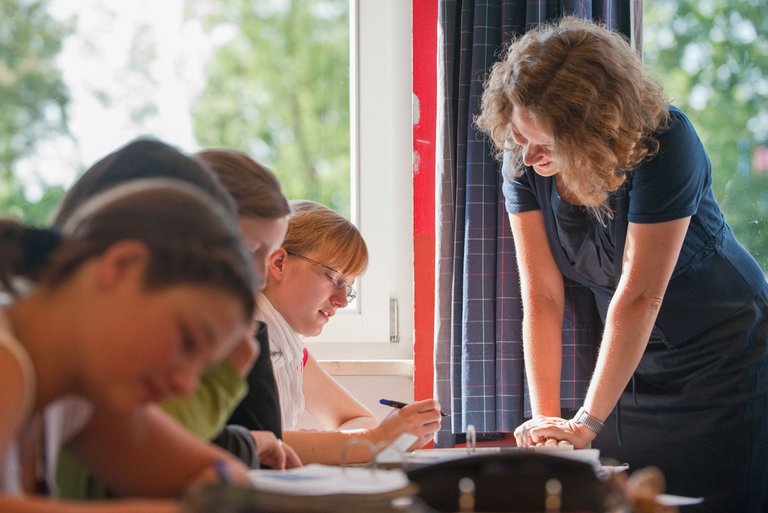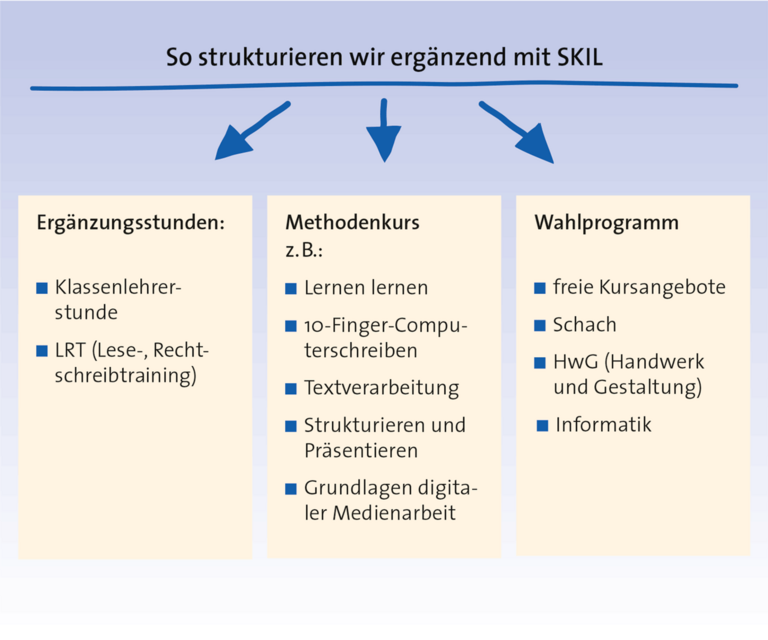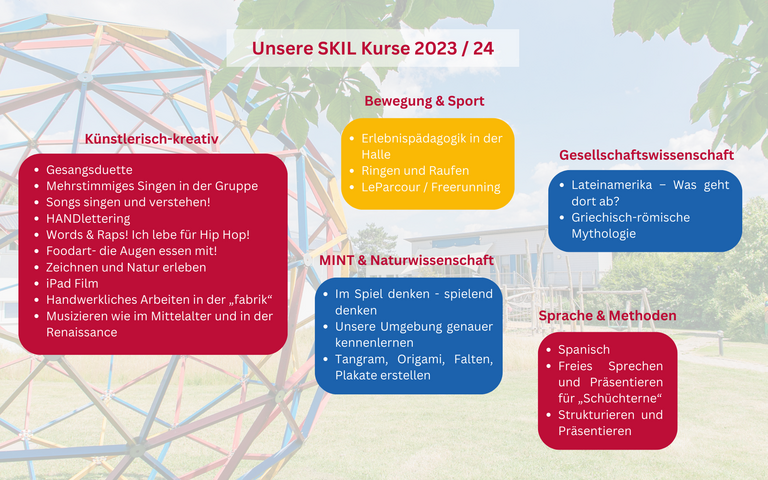Potentials & individual support offers of the Schloss-Schule
We take the time to get to know every student in all their personal facets...
... right from the start! Already the admission interview with us at the Schloss-Schule Kirchberg takes on a high priority. Regular intensive conversations also run like a red thread through everyday life at school and boarding.
The team of teachers and supervisors at the Schloss-Schule repeatedly exchanges ideas with the students about their individual attitudes and their respective behaviour during lessons, in the remedial courses, in interaction with others and in their free time...
In addition, the respective work results are comprehensively analyzed, the communication and learning behavior is carefully recorded and discussed in detail in the team and with the students.

Joachim Scholz – Altschüler & Bürgermeister von Schöntal
Ich habe mich sofort in Kirchberg aufgenommen und wohlgefühlt. Sehr dankbar bin ich den damaligen Erziehern und Lehrern an der Schule. Diese haben mir ein stabiles Fundament bereitet auf dem ich nach meiner Schulzeit aufbauen konnte. Die Grundsteine für mein weiteres Leben wurden größtenteils in der Schloss-Schule gelegt. Dadurch habe ich auch bis heute eine tiefe Verbundenheit mit Kirchberg. Ich hatte und habe einen guten Lebensweg und dafür bin ich sehr dankbar.
Comprehensive recognition of potential at the boarding school Schloss-Schule Kirchberg
However, a truly successful development is not only measured by school grades – but also puts the positive personality development in its entirety in the foreground.
In order to be able to optimally support our students in their development, it is first of all important to assess them correctly both academically and extracurricularly. Only an individual-oriented promotion can be a successful promotion. That is why we at the Schloss-Schule attach such great importance to a comprehensive recognition of potential. Only on such a basis can targeted support and promotion be provided; not only in the school sector, but within the framework of a holistic approach that sees and accepts the individual student in all facets.
Lessons in small classes at the Castle School

With individualized and differentiated lessons in small classes with a maximum of 20 students, free forms of work and alternative performance feedback , we aim to do justice to our students in their personal diversity. Their involvement in the selection of teaching content and methods emphasizes the joint responsibility of our students on the one hand and our teachers on the other hand for optimal teaching.
Our wide range of support beyond the classroom helps to close gaps and improve performance. Preparing for and participating in competitions in small research groups opens up potential and arouses curiosity that goes beyond teaching at school.
"Promoting" and "challenging" in the classroom are two sides of the same coin – the concern to guide our children and young people, to define their own goals and to give them joy in the independent pursuit of more knowledge and better performance.
Less missed lessons thanks to a special school concept
In order to directly address the issue of "school hours lost", which is a major problem for many schools, we developed a special lesson cancellation concept many years ago.
In recent years, about 97% of all school hours at the Gymnasium der Schloss-Schule Kirchberg have been carried out regularly. There is a special procedure at our school in the event of class cancellations: If, for example, a teacher calls in sick, a subject lesson is "replaced" by another class-specific subject lesson – e.B. a German lesson is "replaced" by a math lesson. In the further course of the school year, in such a case, it will be exchanged back if possible. Only in the absolutely exceptional case, another, quasi "foreign" specialist takes over the supervision of the class and works with the students, e.B. current homework or already prepared worksheets. Lesson cancellations can thus be 100% excluded in the lower school, so that we can give students and parents a care guarantee.
In fact, with our concept, we achieve that the prescribed minimum number of hours is achieved for absolutely every school subject at the Schloss-Schule.
Our Schloss-Schul-Förderangebote: Each pupil has an individual support programme
In order to meet the needs of our students in all their facets, we offer a four-part support system outside of the actual lessons:
Hausaufgaben sind von allen Schüler*innen selbst zu erledigen, aber betreut und begleitet. Bei unseren sogenannten Lernzeiten (1,5 h pro Tag für die Klassenstufen 5 bis 9 – mit individueller 15-Minuten-Pause nach Absprache) übernehmen dies ausgebildete Erzieher*innen und Fachlehrer*innen.
Unsere Erzieher*innen sind erste Ansprechpartner, helfen bei der Selbstorganisation und unterstützen bei strukturellen und lernmethodischen Problemen. Geht es fachlich in die Tiefe, werden unsere Schüler*innen in die sogenannten Lernzimmer „weitergeleitet“, in denen Fachlehrer*innen bei spezifischen Fachfragen weiterhelfen.
All participants (pupils, class teachers, subject teachers, mentors, study room supervisors) are in close exchange of information, so that it can be immediately recognized whether additional support measures are necessary beyond homework supervision.
Also part of our Castle School concept up to grade 10 are the so-called basic courses in the core subjects English, Maths and Latin (each 1.5 hours per week), in which, if determined as expedient, 3 to a maximum of 10 students (on the recommendation of mentor, subject or class teacher) participate. These basic courses serve the targeted processing of gaps.
As the third stage of our castle school support system, the system of individual tutoring/support is also used for more comprehensive learning material gaps – the decisive factor here is: always in close and intensive exchange with the respective subject teachers and the class teachers.
If tutoring is used, we rely on experienced and proven lay forces from the environment for routine help, and exclusively on proven specialists for the mediation of new, not understood content. Those responsible have themselves formed a well-founded professional judgement about these specialists, so that the quality of this support is reliably ensured.
So that our students can start the examination phase of the Abitur as well prepared as possible, we organize a so-called intensive week every year. This week there will be additional lessons in the exam-relevant subjects, which specifically prepare for the Abitur and support the students particularly intensively.
In addition, we offer a wide range of options in the field of individual support and promotion in the school sector:
Our students acquire basic methodological skills in the subject of methods, which are useful to them throughout their school career. The subject is taught once hour from grades 5 – 9 and is free of grades. In grade 5, we start with the basic knowledge of digital media work, which includes 10-finger computer writing. From grade 6 onwards, the focus is on different presentation techniques, which in class 8 go hand in hand with the teaching of digital presentation programs. As part of the career orientation, the topics of CURRICULUM vitae and application are taught in class 9.
Many students actually have to learn how to acquire knowledge correctly. As part of the subject Methods, learning at the Schloss-Schule plays an essential role in grade 5. Here, the domestic working conditions are first reflected, according to which the students can create an appropriate working and learning environment for themselves. In addition, they are taught strategies for the effective completion of homework and for independent vocabulary learning. Different learning methods and techniques to prepare for class work are also an essential part of learning learning. In our class 10+ - among other things intended for students who change from the Realschule to the Schloss-Schule - didactically the independent development, as well as the independent and guided reflection are particularly promoted.
Who could bring the English language closer to the students better and on an equal footing, if not young people with English as their mother tongue? Our English language assistants from the USA practice the language with our students in everyday conversation, detached from the teaching situation.
In grades 5 and 6, we test the level of spelling skills of our students after a few weeks with the Hamburg writing and reading sample. If students exceed a certain number of errors, we can determine through this testing that there is a need to catch up. Once a week you can then take part in our LRT course, in which we work specifically on common difficulties in spelling, such as.B difficulties in capitalization as well as in stretching and sharpening. In this way, any gaps in knowledge at the Schloss-Schule are effectively closed right at the beginning of the secondary school career.
Well-known talents are taken into account in our school structures – here we react individually and flexibly and ensure interest- and talent-based offers. In addition, we also open up extracurricular opportunities for the promotion of giftedness with particularly gifted pupils. For example, we can offer students a student course parallel to the lessons.
Competitions in a wide variety of subjects offer our students valuable impulses and offer a completely different approach to the subjects and their contents. Here the challenge idea is in the foreground, there is something to win and you do not have to worry about bad grades. Students often engage here with enthusiasm, which also has an effect on the willingness to learn and perform.
Innovative concepts at the Castle School
Elective Module SKIL: Schloss-Schule Kirchberg - Individual Learning
"The child only learns if he is willing to do so out of an inner drive."
Rowing H. Long

We offer a special form of teaching from the Schloss-schule Kirchberg at our Gymnasium to the children of grades 5 to 7. Different courses offer our students the opportunity to experience learning differently according to their inclinations and talents in addition to the everyday lessons. Our students learn sustainably in projects according to their own interests, methodical and social learning are also an integral part of the lessons.
Our elective module SKIL Schloss-Schule Kirchberg – Individual Learning has the pedagogical background to recognize the peculiarities of the individual student and to promote him/her according to his/her potential.
Because students learn different speeds, different intensities and with changing motivation. The aim is therefore to enable various learning paths in addition to the pure transfer of knowledge. The module is divided into these areas (see graphic).
Our 10+ concept at the Schloss-Schule Kirchberg
This model is for our lateral entrants, Realschuleaufsetzer (children and young people who change from a Realschule to us) and international students of grades 9 and 10. We pursue the following goals with our class 10+: We want to systematically prepare all students for the course level – both methodically and in terms of content.
We want to comprehensively support the students in their personal development and strengthen the development of social skills: i.e. independence, willingness to make an effort, self-management and group inclusion.
The active participation in the learning environment and the regular review of the learning behavior in class 10+ promotes the self-responsibility of action, which becomes essential in the course level. The subject-specific educational content is bundled and more manageable without having to compromise on the level.
Basic knowledge of the intermediate level is repeated in a targeted manner and placed in direct connection with essential technical and methodological content of class 10.
Our concept for students from outside has proven to be particularly effective as a boarding secondary school in order to obtain the Abitur here with us!
The teaching of the first foreign language takes place in small groups. Learning also plays a central role in this. The aim is to enable students with a wide variety of educational backgrounds to achieve the same educational goal, namely the Abitur.
